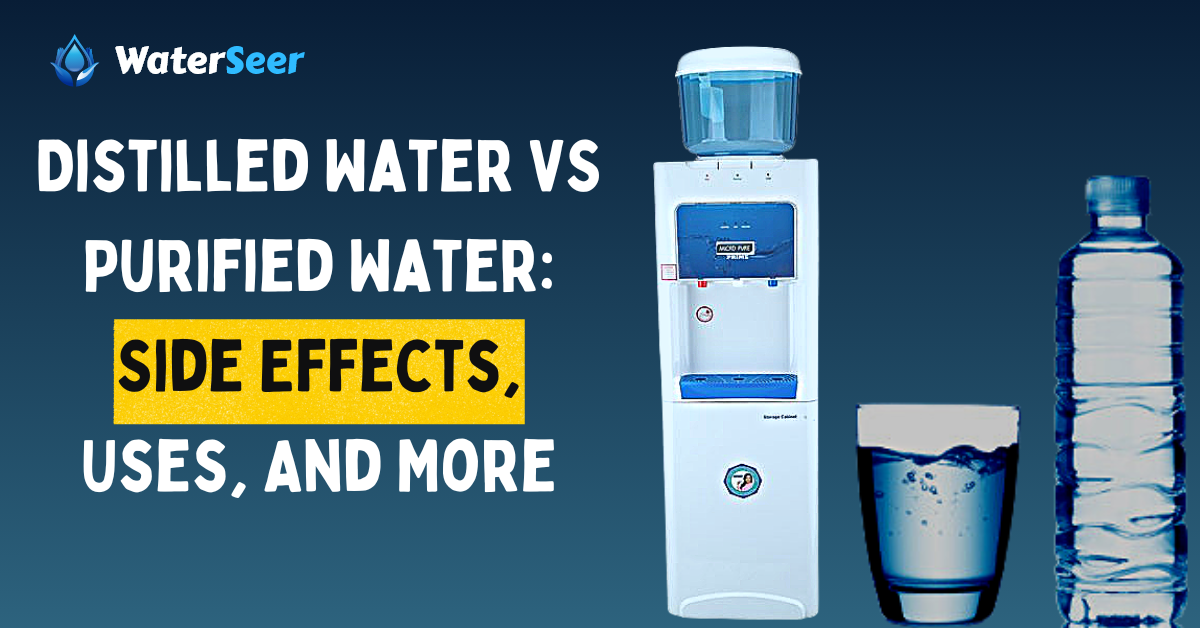Water is essential. Drinking enough water every day is essential. Optimal water intake on the daily is very essential for optimal health.
Each and every cell in the human body needs water in order to be able to properly function. This is why it is important that we all hydrate continuously all throughout the day. We all know this indisputable fact. That’s why we all strive to be more mindful of our daily water intake.
In our journey towards becoming more mindful of taking in enough water and keeping our bodies properly hydrated, we encounter many things that can guide us. We educate ourselves with the amount of water that is optimal for us individually. We use reusable water bottles to make sure we always have water nearby. We know how much water our containers hold so we know how many times we should drink up and refill throughout our day. We listen to our bodies and take a sip each time we are thirsty. We search for the best and most cost-efficient sources of water we can find for ourselves – and our families too.
What is Distilled Water?
Distilled water is a type of purified water that has been taken to go through the distillation process. The distillation process is among the methods that can be utilized to purify water. Basically, in the distillation process, the pure water is boiled away from its contaminants.
Many contaminants that are found in water are inorganic minerals and metals. These have very high melting points and even higher boiling points. Because of this, as the water (and the contaminants) boil, the pure water turns into steam which is captured and cooled to then turn into distilled water. The contaminants are left behind, which leaves water that has been purified for drinking.
Read More About: What Is Distilled Water? Uses and Safety
How is Distilled Water Made?
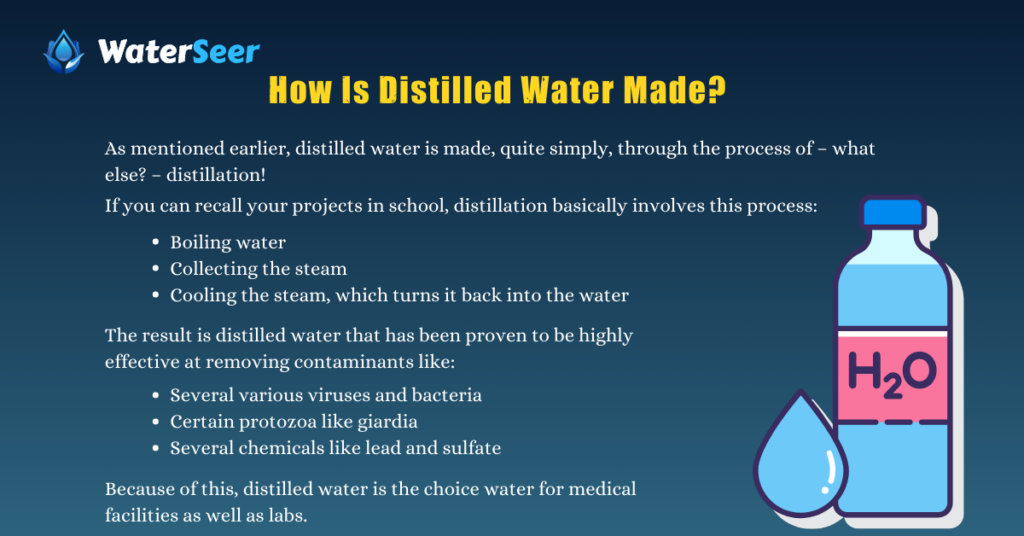
As mentioned earlier, distilled water is made, quite simply, through the process of – what else? – distillation!
If you can recall your projects in school, distillation basically involves this process:
- Boiling water
- Collecting the steam
- Cooling the steam, which turns it back into the water
The result is distilled water that has been proven to be highly effective at removing contaminants like:
- Several various viruses and bacteria
- Certain protozoa like giardia
- Several chemicals like lead and sulfate
Because of this, distilled water is the choice water for medical facilities as well as labs.
Health Benefits Of Distilled Water
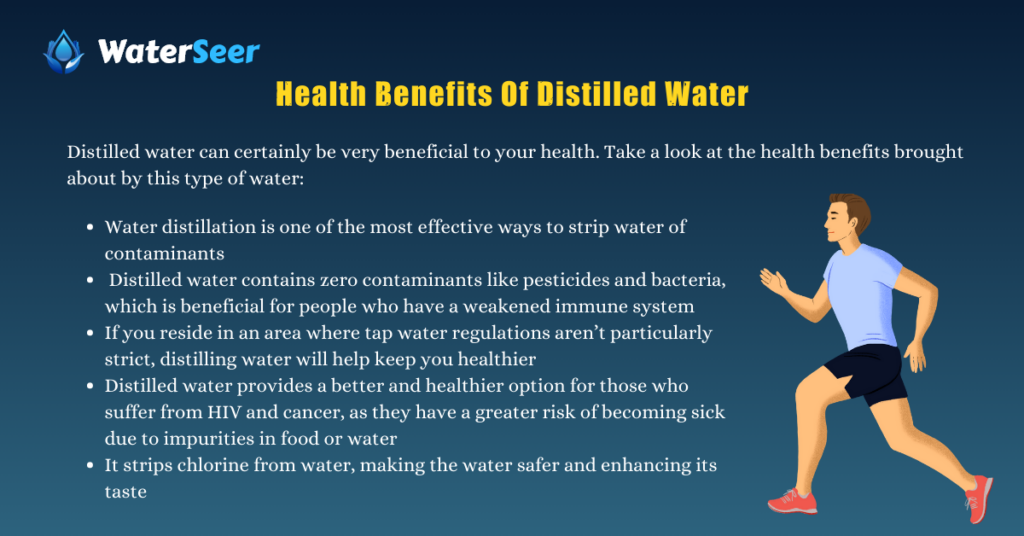
Distilled water can certainly be very beneficial to your health. Take a look at the health benefits brought about by this type of water:
- Water distillation is one of the most effective ways to strip water of contaminants
- Distilled water contains zero contaminants like pesticides and bacteria, which is beneficial for people who have a weakened immune system
- If you reside in an area where tap water regulations aren’t particularly strict, distilling water will help keep you healthier
- Distilled water provides a better and healthier option for those who suffer from HIV and cancer, as they have a greater risk of becoming sick due to impurities in food or water
- It strips chlorine from water, making the water safer and enhancing its taste
Should You Drink Distilled Water?
Experts say that you should not opt to drink solely distilled water alone – it is highly recommended that you drink it every now and then. After all, it provides many health benefits. It does come with some issues as well, which you should know about before you consider taking in distilled water.
Potential Downfalls of Distilled Water
Distilled water is considered to be the cleanest and purest water you can find. That’s wonderful and all, but it does not mean that this type of water is going to be the healthiest choice for you to drink. Here are issues associated with drinking distilled water:
- The distillation process takes away contaminants, yes, but it likewise strips the water of electrolytes and natural minerals that are important for good health
- Healthy minerals like calcium and magnesium are stripped completely from distilled water
- Not being able to get enough magnesium and calcium puts you at greater risk of fractures, heart diseases, and preterm birth
- Distillation also removes fluoride, which is something that can help in the prevention of cavities
If you are able to maintain a balanced and healthy diet, it will be safe for you to consume drinking water. Just make sure that you are able to get the electrolytes and healthy minerals removed from distilled water through your diet.
What is Purified Water?
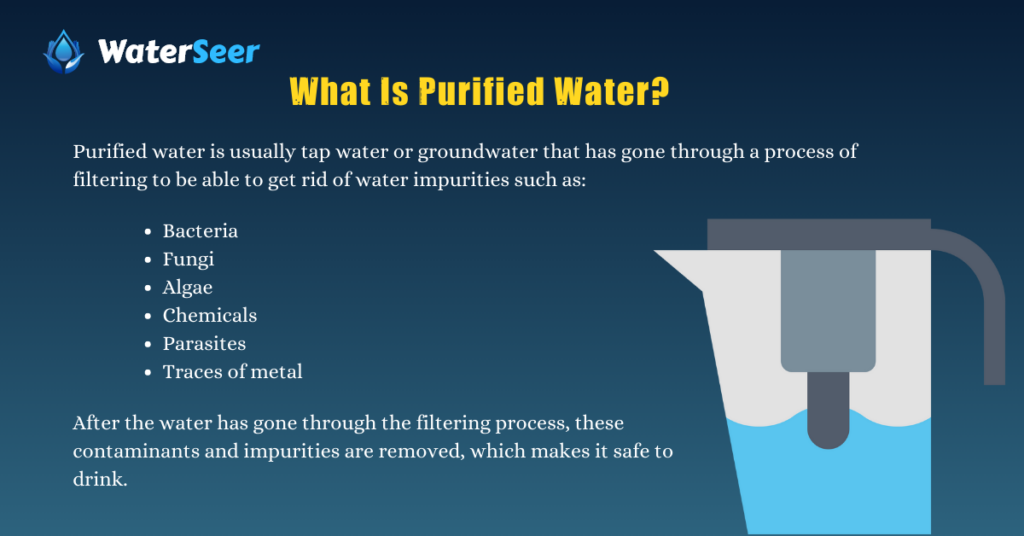
Purified water is usually tap water or groundwater that has gone through a process of filtering to be able to get rid of water impurities such as:
- Bacteria
- Fungi
- Algae
- Chemicals
- Parasites
- Traces of metal
After the water has gone through the filtering process, these contaminants and impurities are removed, which makes it safe to drink.
How is Purified Water Made?
There are several methods that are used in purifying water both commercially and in the home. In a lot of Western countries, public drinking water is then purified so that it becomes safe for human consumption.
In locations that purify public drinking water, these are some of the treatments used:
1. Coagulation And Flocculation
Here, positively-charged chemicals are put in with the water for it to bind with negatively-charged particles so that they can then be filtered out. This process leads to the formation of larger particles that are called floc.
2. Sedimentation
Because of its larger size, floc then settles at the bottom of the water supply. They will be separated from the water that is clean, which is on the top part of the water supply.
3. Filtration
Now, the clean water that is on top of the water supply flows through many filtration systems that are made out of sand, gravel, and charcoal. This strips off the contaminants such as bacteria, dust, viruses, and chemicals.
4. Disinfection
In this step, chemical disinfectants such as chlorine are added to the water so that they can kill any remaining viruses or bacteria that might have managed to survive the first steps.
Note that how water is treated may differ depending on the location and the quality of water there.
Health Benefits Of Purified Water
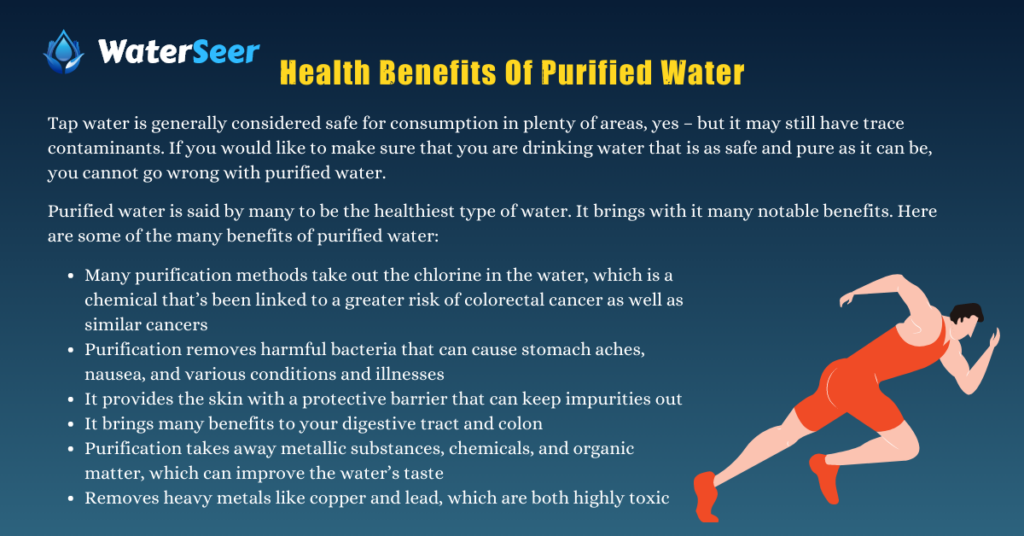
Tap water is generally considered safe for consumption in plenty of areas, yes – but it may still have trace contaminants. If you would like to make sure that you are drinking water that is as safe and pure as it can be, you cannot go wrong with purified water.
Purified water is said by many to be the healthiest type of water. It brings with it many notable benefits. Here are some of the many benefits of purified water:
- Many purification methods take out the chlorine in the water, which is a chemical that’s been linked to a greater risk of colorectal cancer as well as similar cancers
- Purification removes harmful bacteria that can cause stomach aches, nausea, and various conditions and illnesses
- It provides the skin with a protective barrier that can keep impurities out
- It brings many benefits to your digestive tract and colon
- Purification takes away metallic substances, chemicals, and organic matter, which can improve the water’s taste
- Removes heavy metals like copper and lead, which are both highly toxic
Should You Drink Purified Water?
It is highly recommended that you drink purified water. This type of water is very, very healthy, and it is able to remove almost all of the contaminants that still remain when you drink public drinking water.
Consuming water that has been purified from about 99 percent of contaminants is of course, always healthier than consuming water that still has contaminants in it, even just a small percentage.
Having said that, while purified water is indeed healthy and safe to drink, you should also drink other types of water too. The reason for this is that ultra-pure water has no electrolytes. Your body needs electrolytes, and a deficiency in electrolytes may lead to having high blood pressure as well as other health problems.
Potential Downfalls Of Purified Water
Purified water is healthy, but there are still some issues that you should know. Drawbacks exist, which you should be aware of before drinking purified water. Here are some of the main issues with water that is purified:
- Some purification systems remove fluoride from water, and fluoride is a mineral that is helpful in reducing tooth decay and improving dental health
- Water purification systems should be maintained on a regular basis to make sure that contaminants don’t start building up on older filters
- It is still possible that the process will not be able to remove certain contaminants, including some pesticides and chemicals
- Buying purified bottled water or having an in-home purification system installed at home can be pricey, which is why you should still evaluate the pros and cons of drinking this type of water
- If you choose to buy plastic bottles of this kind of water, this choice can cause a significant amount of waste that is harmful to our environment
Distilled Water VS Purified Water: Pros & Cons
Let’s simplify things!
Distilled Water
Distilled water is the purest water there, and that certainly sounds great. But there’s still a catch.
- It’s a much better option than tap water if you reside in an area with water that is contaminated
- There is absolutely zero chance that you will drink any contaminants in your water
- It is very beneficial for people who have conditions that make them immunocompromised
- Distillation also removes chlorine making water more tasty and appealing
- Distilled water is very pure and very clean, but it can be a bit too pure with zero healthy minerals
- You need to be more mindful of your diet to make sure you are getting those missing minerals elsewhere
Purified Water
Same as distilled water, purified water is pure and safe to drink. But there are drawbacks too.
- Purification will definitely improve your tap water, particularly if you are in a place with lower standards of drinking water
- Purified water tastes pretty good, which will entice you to drink more
- It is relatively simple to make
- Purification removes fluoride, and fluoride is essential in tooth decay prevention
- At times, purification does not remove all contaminants – particularly when compared to distillation
- Water filtration systems require quite a bit of upkeep to ensure that they keep working properly
Distilled Water VS Purified Water: Which Is Ideal For You? (Conclusion)
At the end of the day, both distilled water and purified water are healthy for you and are in many ways the same.
The primary difference between the two is this: Purified water does not necessarily strip away all of the healthy minerals found in water, unlike distilled water which is the purest form of water, making it lacking in healthy minerals that may also be good for you.
- If you want the cleanest and purest water around, the recommendation is to choose distilled water
- If you want to consume clean water that is a bit healthier, purified water may be best for you
Both distilled water and purified water are healthy for as long as you are mindful in maintaining a balanced diet.
Understanding what each type of water entails and their differences from each other will help you to identify which of the two is best for you. Choose wisely – and drink up!

